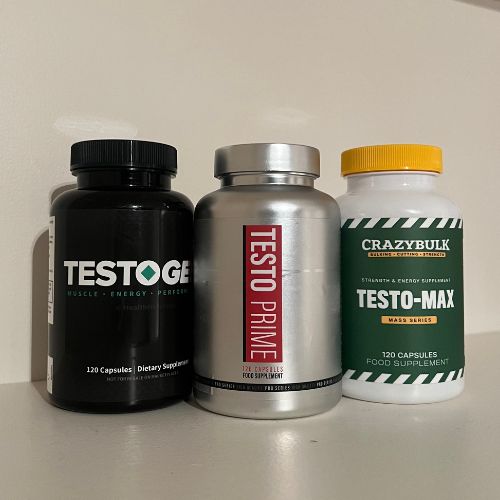Right up front: forget what you’ve heard about Low Testosterone on Social Media. There’s no evidence that UV rays will increase your T production (no matter what part of your body), and eating a lot of steak and “being an Alpha” won’t make your Leydig cells pump out more T.
But one thing you may have heard is correct–Testosterone levels are at historic lows. And it’s not because men are taking office jobs or staying at home with the kids. It’s because our modern diet is full of fat, we’re not exercising properly, and the world is filled with toxic chemicals.
There are several other factors to consider, as we’ll see. Testosterone health is important, and it’s more important to get right than to confirm our biases. So let’s get after the facts.
What You Need to Know:
Population Drops Over Time
Many of the factors we’ll explore here are similar to what leads to Low-T in individuals. But we’ll be taking a population-wide lens. That is to say that while you may know that body fat leads to one man’s Low-T, we still need to see how that’s playing out over large swaths of the male population.
This helps us see that there’s no grand conspiracy to deprive us of our T. What’s really happening is millions of men drifting along with what’s easy, and it’s killing their T.
Body Fat
The data are in: obesity kills Testosterone. And right now over 40% of people are obese. Before we look at individual factors like exercise, inactivity, or diet–and before we jump down rabbit holes about someone’s politics or their cultural preferences–let’s just savor this datum.
As we as a population increase in weight and body fat percentages, our Testosterone plummets. While we can debate what’s leading to the obesity epidemic (though there’s largely little debate in the medical community), the fact remains: until we as a society stop gaining fat our T-Levels will suffer.

It’s Not if You Exercise but How You Exercise
Many of you may be wondering, “Okay, so if I exercise enough I can boost my Testosterone?” Not quite. Many studies–in men and women–have noted that overtraining in endurance sports reduces Testosterone production.
This may be partially responsible for the fact that 20% of young men have low T. In an odd twist, it’s not that young men are adopting unmanly lifestyles–it may be that some of them are overcompensating with extreme exercise routines.
The obsessions with biking, running, and other endurance-oriented workouts may be partially responsible for the population-wide drops in T we’ve seen over the last few decades.
We are What We Eat

Here we’ve already made the connections between our body fat percentages and our T-Levels. But going low-fat in our diet isn’t the answer. In fact, low-fat diets aren’t really good for weight loss, at all. And more to our purposes, here, recent data suggest that low-fat diets could be leading to widespread Low-T levels.
The mechanisms aren’t exactly clear. But there are a growing number of healthy foods that could be altering your hormone levels. So as society becomes healthier, and we all try to eat better, we may inadvertently be lowering our T levels.
Toxic Environments
No, I’m not talking about people you don’t like, or trigger words. I’m talking about literally poisonous substances in our air, our food, and our drinking water. Even coming into contact with normal plastics can damage our hormone systems.
Every day we’re surrounded by, we consume, and we interact with hundreds of these Endocrine Disrupting Chemicals (EDC), and it’s driving our Testosterone down. Not to be political, but these effects are the highest in America, where air, water, and ground pollution are causing billions of dollars in EDC damage every year.
What You Can Do About It
Environment
I’m not recommending anyone go on a Green Crusade to save humanity’s T-Levels. (Unless you want to; fine by me.) But we can all be more conscious about what sort of toxins we’re subjecting ourselves to. Whether it’s cutting down on alcohol (sorry, it is a toxin), using glass water bottles instead of plastic, or simply replacing air filters in our living spaces more often. Whatever you can do to improve your environment will also improve your Testosterone health.

Exercise
As we mentioned above, we want to regulate our body weight, but not kill ourselves at the gym, either. The secret is to mix in high intensity workouts with strength training. In one study, men who performed HIIT style workouts had a 30% jump in Testosterone.

Supplements
I’d be remiss if I didn’t mention that there are several high-quality options for supplementing your daily routine to increase your Testosterone. After all, we can’t change every part of our environments, and for many of us, we simply can’t afford to completely overhaul our eating habits.
In these cases, a safe and effective T-Boosting Supplement could be the key to offsetting the myriad factors lowering your T. But not all Testosterone products are created equal, which is why we curate a list of only the most scientifically grounded, well-researched T-Boosters available. Click here to read it.

What Does it All Mean?
Except for individual concerns, largely nothing. There are no large-scale studies demonstrating any society detriment to lower T-Levels. There are some countries, typically island nations like Japan and Ireland, that have experienced lower birth rates, but that is attributable to a number of factors, none of which are Low-T.
The impact of Society’s Low T is largely felt on the individual level. Raising Testosterone for all men overnight won’t solve our problems as a world population–but raising yours could mean the difference between heart-disease, diabetes, obesity, and muscle loss–or aging as a healthy, vigorous, active man.
Final Thoughts
Falling T-Levels aren’t the reason for every bad thing happening in the world. Most people claiming that have an agenda. Our agenda at the Great Green Wall is helping you improve your health and wellness, inside and out. For many men, that means coming to terms with the large-scale factors that may be contributing to lowered T.
Many of these factors have come into our daily lives with good intentions–like exercising and eating less fat. But understanding how these could be contributing to population-wide decrease in T could also be vital in understanding how to reverse your own low T. And to getting it back on track, so you can stay on track.

